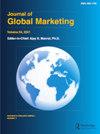Perceived Resilience and Vulnerability during the Pandemic-Infused Panic Buying and the Role of COVID Conspiracy Beliefs. Evidence from Pakistan
IF 4.3
Q1 Business, Management and Accounting
引用次数: 3
Abstract
Abstract Drawing on theoretical streams of compensatory control theory, regulatory focus theory, and cognitive load theory, this study proposes and validates a model to illustrate the underlying mechanism of panic buying behavior in an online context during the COVID-19 pandemic. Building on the scholarly research on compensatory control theory, regulatory focus theory, and cognitive load theory, this study is one of the preliminary attempts to investigate the relationship between consumer’s perceived resilience and vulnerability with COVID-19 threat perceptions and panic buying. This paper also provides a novel empirical inquiry into the moderating role of COVID-19 conspiracy beliefs. Using an online survey, a total of 395 usable responses were collected. The data were collected during the lockdown imposed in May-June 2021 in Pakistan after the country was hit with the second wave of the COVID-19 pandemic. Overall findings signaled that resilient consumers perceived a lesser threat of COVID-19 as compared to vulnerable consumers, and consequently, panic buying disposition was more prevalent among the vulnerable consumers. COVID-19 conspiracy beliefs exhibited significant interaction effects. The implications for the e-commerce sector in general and online retailers, mainly, are discussed regarding panic buying and personality type of consumers.大流行引发的恐慌性购买和COVID阴谋信念的作用期间的感知弹性和脆弱性。来自巴基斯坦的证据
摘要本研究借鉴了补偿控制理论、调节焦点理论和认知负荷理论的理论流,提出并验证了一个模型,以说明新冠肺炎大流行期间在线背景下恐慌性购买行为的潜在机制。本研究建立在补偿控制理论、调节焦点理论和认知负荷理论的学术研究基础上,是研究消费者感知的韧性和脆弱性与新冠肺炎威胁感知和恐慌性购买之间关系的初步尝试之一。本文还对新冠肺炎阴谋信念的调节作用进行了新颖的实证研究。通过在线调查,共收集了395份可用回复。这些数据是在2021年5月至6月巴基斯坦遭受第二波新冠肺炎疫情后实施封锁期间收集的。总体调查结果表明,与弱势消费者相比,有韧性的消费者认为新冠肺炎的威胁较小,因此,恐慌性购买倾向在弱势消费者中更为普遍。新冠肺炎阴谋信念表现出显著的相互作用效应。主要讨论了恐慌性购买和消费者个性类型对电子商务部门和在线零售商的影响。
本文章由计算机程序翻译,如有差异,请以英文原文为准。
求助全文
约1分钟内获得全文
求助全文
来源期刊

Journal of Global Marketing
Business, Management and Accounting-Business and International Management
CiteScore
6.80
自引率
0.00%
发文量
10
期刊介绍:
Stay current on cross-cultural marketing at both micro and macro levels! The Journal of Global Marketing is the top-notch journal packed with the latest global marketing planning and programming strategies, current information, and contemporary research findings on marketing challenges and opportunities that firms, industries, and public sector agencies encounter worldwide. The expert contributors to the journal include leading marketing and international business scholars, practitioners, and policymakers who provide up-to-date practical information vital for management and administrative professionals.
 求助内容:
求助内容: 应助结果提醒方式:
应助结果提醒方式:


